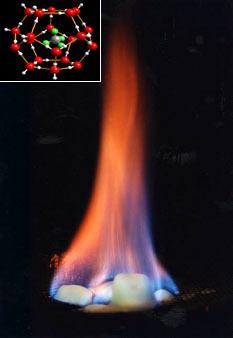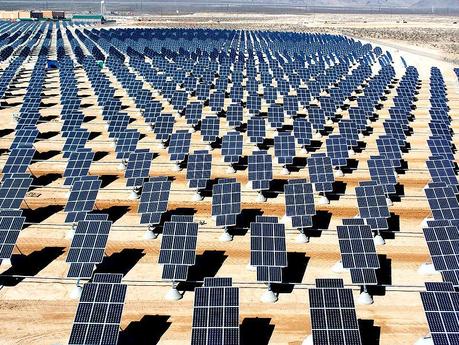We need energy. We use energy. But the question is- do we use it efficiently? The energy that is produced by burning precious fossil fuels in thermal power plants is consumed in a matter of mere seconds. It is, in fact, sure that we cannot meet our needs of energy if we go on like this for a few more years. Fossil fuels like coal and oil will be exhausted. We can’t expect the fuel to form again either- that would take millions of years. So, what are we going to do?
Scientists say we can turn to another fuel- a fossil fuel indeed. It is none other than methane, or CH4.
This is found under the ocean. The methane is formed due to organic decay. Under high pressure and low temperatures, the gas combines with water and is encased in ice. This is called a gas hydrate. This ‘ice’ burns just like coal. And, it is very efficient. However, extraction of methane from the depths of the ocean is not an easy task.

Burning of methane hydrate-courtesy of the U.S. Geological Survey
Now, even if we happen to extract it somehow, even then, there’s a problem- burning this methane, again, produces carbon dioxide. In a situation when we have burnt all the fossil fuels, more CO2 , is not a good thing for the atmosphere.
Is it, ever possible to have completely, clean energy? The answer is, Yes. We could use alternative energy sources, like wind, solar energy, nuclear energy, etc. But the most appealing one is, solar enegy.
The sun is, when compared to us, seemingly perennial. The never ending flow of heat and light- the sun, the very thing that is the ultimate supporter of life on the earth. But can we use it efficiently?We know, we have solar panels made up of photovoltaic cells. But why aren’t they replacing or, at least competing with oil and coal? The reason is, we don’t know how to use solar energy efficiently.
Until recently, solar energy was considered not reliable enough. The solar panels we use today have a maximum efficiency of only about 18%. However, scientists have now found out that by heating highly conductive elements like selenium in a vacuum up to 5100 degree Fahrenheit, they form a new crystal lattice – one so small that you could arrange 3 million of these ‘nano crystals’ on your fingernail! But, the most surprising change in the light absorbing properties of Selenium change.
The solar cells we use today absorb only Infrared rays. The rest of the spectrum’s energy is converted into useless heat. But by arranging many nanocrystals in a cell, we can have solar cells as efficient as 83%. However, there is a problem- the crystals are too small, so they are hard to arrange in the hexagonal pattern. Scientists are currently researching on this. So maybe, one day, if we cover our homes’ roofs with solar panels, we’d get enough energy for our use, and at the same time, we could sell four times as much energy back to the grid. Then, oil rigs will be replaced by solar farms. All of these are just visions of the near future- but for the time being, let us be careful and conserve energy.

Giant photovoltaic array- a solar farm.
Photo courtesy- U.S. Air Force


COMMENTS ( 1 )
posted on 18 November at 23:36
Israeli scientists are also using nanotechnology to create solar panels equipped with tiny antenna that use optics to capture and use electromagnetic energy to produce electricity. They are talking about efficiencies similar to what is mentioned here, or even higher.